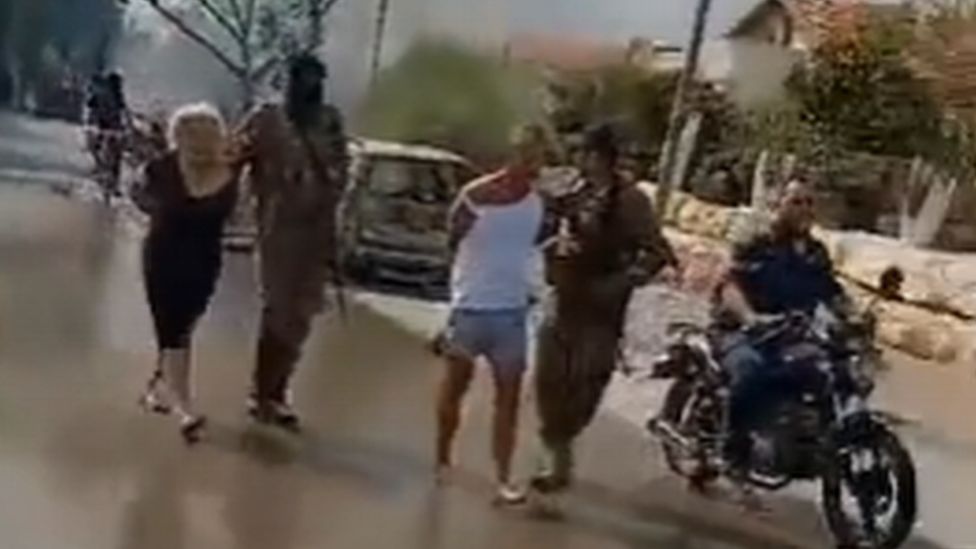IN THE MEDIA
Will the barbarity be allowed to prevail?
October 12, 2023 | Allon Lee

Canberra Times – 12 October 2023
Crumpled bodies of men, women and children in the streets or hanging out of the side of vehicles. Some at bus stops, others in blood-drenched bomb shelters.
Hundreds of young people at a music festival cut down in their prime, many of the women showing signs of rape.
Terrorists, spitting on the half-naked body of a dead woman, calling out “Allahu Akbar” as they celebrate their prize. Shell-shocked Israelis paraded through Gaza.
These are a few of the harrowing images from the nightmare the Islamist terror group Hamas inflicted on Israel, which is being compared to the Sept. 11 attacks in the US.
The raw numbers are staggering – 900 Israelis murdered in cold blood, 2000 plus wounded, and 130 taken hostage in Gaza.
Even allowing for Hamas’ precisely coordinated operation, how did Israel, with its famed intelligence networks and defence systems, let this happen? Why were security forces so thin on the ground?
In due course, Israel will doubtless hold far-reaching commissions of inquiry to answer these and other troubling questions.
Yet we already know that with an implacable enemy dedicated to its destruction, Israel can never, ever let its guard down, not even for a second.
Hamas is not alone in celebrating its gruesome achievement, with Iran – which funds Hamas and trains its fighters – crowing too. Reports have quoted senior members of Hamas and Hezbollah implicating Iran’s Revolutionary Guard Corps in the planning of the operation. Indeed, Teheran has predicted all year that the “resistance” would soon destroy Israel.
The scale of Iran’s support for Hamas was revealed in April by Ziyad al-Nakhalah, the leader of the Iranian-controlled Palestinian Islamic Jihad, who told Iraqi TV that Hamas receives US$150 million annually from Teheran.
That same month, former Israeli national security adviser Major General (res.) Yaakov Amidror warned that Iran was pushing Hamas and Hezbollah “to act more boldly” against Israel. Amidror explained that Teheran believed months of street protests against the Netanyahu Government’s controversial judicial reforms agenda was evidence that the country was weak.
There is growing speculation that another proximate cause for the attack was Iran’s goal of derailing US efforts to finalise a historic peace deal between Israel and Saudi Arabia. Such a deal would effectively end the Arab-Israeli conflict, a prospect anathema to both Teheran and Hamas.
Hamas’ claimed justifications for the attack – which it called the “Al-Aqsa Deluge” – are barely credible. Hamas military leader Mohammed Deif said the operation was payback for the “desecration of the al-Aqsa Mosque.”
This refers to the small numbers of Jews who occasionally visit Judaism’s holiest site, Jerusalem’s Temple Mount, on which the al-Aqsa Mosque and the Dome of the Rock are built, and which previously housed Judaism’s First and Second Temples. These visits comply with agreements in place since 1967, and those visitors never enter the mosque itself.
Disappointingly, while some commentators have condemned Hamas’ violence, they parroted its justifications, citing “the occupation” and “the blockade of Gaza”.
But wiser heads know that Hamas’ talk of “occupation” does not mean the West Bank or east Jerusalem but the State of Israel. Following the attacks, Hamas leader Ismail Haniyeh said his message to Israelis was, “Get out…This land is ours, Jerusalem is ours, everything is ours.”
Moreover, Israel’s occupation of the West Bank only continues because Palestinian leaders refused generous Israeli offers in 2000, 2001 and 2008 to create a Palestinian state, and since 2014 have rejected participating in peace talks.
Furthermore, the blockade was only imposed because Hamas has used Gaza – from which Israel totally withdrew in 2005 – as a base to indiscriminately fire thousands of rockets at Israeli towns and villages.
Now, Israeli PM Benjamin Netanyahu determined to disprove Hamas and Teheran’s belief in Israel’s weakness, promises Israel will “fight back on a scale and intensity that the enemy has so far not experienced.”
In stark contrast to Hamas, which deliberately targeted civilians, Netanyahu warned ordinary Palestinians in Gaza to flee from “all the places that Hamas hides in, operates from, we will turn them into ruins.”
In formulating its response, Israel’s biggest quandary is the hostages in Gaza. Its other challenge is the reality that Israelis see no prospect for elementary security as long as Hamas rules Gaza. However, dislodging Hamas will likely be extremely bloody and finding a new arrangement for the governance of Gaza far from straightforward.
The scale of Israel’s task is immense and it will need the political and moral support of its allies, including Australia.
To date the West has shown that it understands Israel is not only battling Hamas but also Iran and its other proxies – who have shown a ruthless disregard for all civilised norms, not only in Israel, but across the wider Middle East, including Syria, Iraq, and Yemen. Time will tell if such brutality and barbarity will be allowed to prevail.





